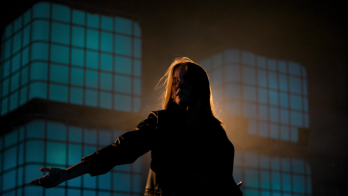Whenever I tell people that I am from Brazil, it is always met with an outpouring of love for my people and my country. Yes, Brazil is amazing. People are always shocked to learn, though, that the country of G-strings, supermodels, soccer, Brazilian waxes, samba, and carnival, was a militarily ruled nation in my lifetime.
I had just turned 3-years-old when the military dictatorship was overthrown on March 16th, 1985. Like many communist and oppressive nations, people in Brazil lived in constant fear and under strict censorship. Hundreds of thousands of dissenters were tortured, killed, or “disappeared.” My mom often recounts stories of my family’s worries that her eldest brother, who studied in our state’s capital, would be arrested one day. He was a fearless dissenter, member of a Marxist guerrilla group that included none other than the current Brazilian president Dilma Rousseff.
This morning, as I watched coverage of the protests from last night on our Brazilian channel Rede Globo, my mom said, “They finally woke up.” I think she was as shocked as I was. Brazilians have sat idle since that revolution of 1985. I never took my people to be the protesting kind. For over two decades they have lived passively with a 75 percent importation tax, dismal public education, crumbling infrastructures (I’m talking about gaping holes in the middle of major intercity dirt highways), and Russian-like corruption.
Let me put it this way, our last President was a lower-middle class simpleton who won his election by pandering promises to the poor majority, his son was a minimum waged zookeeper, and yet on a presidential salary of less then 10K a month and a zoo keeper resume, both are now featured on Forbes’ wealthiest list…in the billions. And no one ever spoke out.
The protests began two-weeks ago over an increase in bus fares. Buses in Brazil are notoriously over-crowded (think of a train-car in India), and falling apart, literally. But, by yesterday, the protests had expanded in numbers and in indictments against the Brazilian government: urban violence, lack of domestic security, lack of public services, corruption, poor education, high taxes, high cost of living, and most importantly, the financial burdens of the World Cup.
Let me be clear, we are soccer country to the core. The problem is not against the World Cup. It is against the corruption between private entities and government officials. The states have injected billions of taxpayer Reals into renovating privately owned stadiums in preparation for the World Cup, and will hand these brand new facilities back to the private sector once the festivities conclude. All the while, claiming there is no money for public education, fixing infrastructures, and subsidizing public health and transportation systems. How will the taxpayers get a return on the money that was used to makeover these stadiums? Simply put, they won’t.
In my beautiful country there is no upward mobility. If you are born poor, you are destined to be poor forever. Unless, of course, you are one of the small few who are born beautiful enough to be a supermodel abroad, or talented enough to be a soccer player. Yes, shockingly, those are professions for the poor. Unlike the U.S., no respectable girl or boy from a family with financial means would ever lower themselves to such low-class careers. You go to the best schools and become a doctor, a lawyer, or an engineer. But, since public education does not allow the majority to attain those same career goals, perhaps the poor have finally had enough. Praying that your first-born will be the next Gisele or Pele, and sponsor your entire family, is no way to live.
The protests, in general, were passive and peaceful. Their message was clear: “O Povo acordou, O pouvo decidiu, Ou para a roubalheira, Ou paramos o Brasil.” (The people have awakened, the people have decided, either stop the corruption or we stop Brazil.) And just like the protests of the Arab Spring, they are using social media like Twitter, Facebook, and Orkut to organize.
There were a few rotten apples attempting to disrupt the protestors’ efforts at peaceful assembly, but the majority spoke out against these vandals in an attempt to distance themselves from such negative conduct. This morning, protestors even returned to the streets in major cities to clean up the graffiti marks and garbage that was left behind.
In the wake of all of these protests, a new report has leaked that government officials, who want to attend the Confederations Soccer tournaments that are currently underway in Brazil, will have their room and board, transportation, and stadium suites covered by none other than the Brazilian tax payer.
I pray that these protest lead to real change in Brazil, and in the Brazilian people. Today, more then ever, I am very proud to be Brasileira.
Danielle DeAbreu
Danielle DeAbreu is a former model and student at William Paterson University studying Broadcast Journalism with a minor in Political Science.
Follow me on Twitter @DaniDeAbreu13















